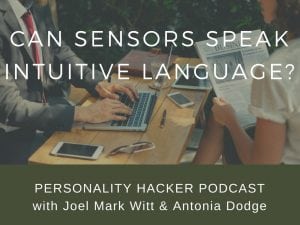Download Episode Here – right click link and select “Save Link As…”
In previous episodes, we talked about Intuitives being “bilingual” and speaking Sensor language. In this episode, Joel and Antonia talk about whether or not Sensors can also be “bilingual” with Intuitive language.
In this podcast you’ll find:
- The number one thing people ask the most is, “What is my type?”
- They take a test and start exploring their type then they realize they look more like another type.
- The more they explore, the more confused they become.
- The journey started with the test.
- Can Sensors be bilingual with Intuitive conversation?
- Intuitive convo = abstract, speculative conversation.
- Intuitives can be bilingual because they are surrounded by Sensors most of the time.
- Sensor language = concrete, verifiable conversation.
- Car Model
- Some Sensors grow up in Intuitive households.
- Neuroscience Of Personality With Dr. Dario Nardi
- ENFPs are the most homogeneous. ISTJs are the most diverse.
- Sensors can be very adaptable.
- The trend is that Intuitives are surrounded by Sensors, and so they become bilingual.
- That is the trend, not the rule.
- The rule is that everything is a little different when played out in reality.
- Profiler Training course teaches people how to type other people.
- Our best students are often Sensors.
- It is not entirely true that Sensors cannot keep up with Intuitive conversation.
- They may not have much interest in it, but they can often engage.
- Everybody has Intuition in their cognitive function stack.
- And everybody has a Sensor function in their stack.
- The lower down the stack it goes, the more childlike it is.
- A Sensor with an Intuitive process may love fantasy and improv.
- The higher up your stack intuition falls, the more comfortable you are with intuitive conversation.
- When Intuition is your dominant process, you probably tend to look for careers and ways to manifest this intuition in day to day experience because it is so rewarding.
- A person who leads with Intuition has endless amounts of space for Intuitive conversation.
- The further down the stack it goes, the less intuitive conversation you enjoy.
- That doesn’t mean you don’t enjoy Intuitive conversation. You just reach the law of diminishing returns.
- Intuitives are the same way with small talk.
- Once you hit a threshold it becomes a chore. But before that threshold it is pleasant.
- It isn’t an off/on switch.
- Desire vs. threshold.
- Thinker/Feeler has thresholds too.
- Thinkers aren’t all cold and robotic as the stereotypes say.
- Feelers aren’t all irrational and emotive.
- What is emotionally vs. mentally taxing?
- Thinkers have a higher threshold for things that are mentally taxing.
- Feelers have a higher threshold for things that are emotionally taxing.
- Depending on where your Thinking/Feeling preference sits in your stack will determine how much tolerance you have.
To subscribe to the podcast, please use the links below:
Subscribe with iTunes
Non-iTunes Link
Download The Android App
Subscribe on Soundcloud
Subscribe with Stitcher
Subscribe on Google Play
Subscribe with Facebook Messenger
If you like the podcast and want to help us out in return, please leave an honest rating and review on iTunes by clicking here. It will help the show and its ranking in iTunes immensely! We would be eternally grateful!
Want to learn more?
Discover Your Personal Genius
We want to hear from you. Leave your comments below…



Share:
Podcast - Episode 0202 - Extraverted Feeling vs Introverted Feeling
Podcast - Episode 0204 - Mistakes vs Blind Spots
5 comments
INTPs shouldn’t have Introverted Intuition driver—INTPs have Introverted Thinking, Extraverted Intuition, Introverted Sensing, and Extraverted Feeling!
I am Isfp and my mother is enfj and my two sisters are infp and infj. My husband is also Intp so I guess being raised around Intuitives my whole life I have a higher threshold for these kinds of conversations and I find enjoyment in some of the conversations they have with me and eachother. It’s very interesting to listen and depending on the subject I have things to add to the conversation. After a certain amount of time though it will make me tired and I may start to space out lol
Yesterday I commented on a more recent podcast with a question about the difference between intuitive thinkers and intuitive feelers.
Now I listened to this podacst and I can be more specific I think. In the end a comparison is made between ‘meticulous information’ and ‘drama’.
But ‘drama’ can be very ‘meticulous’.
The language often used on this site doesn’t always resonate and I think it’s not only because I’m not a native English speaker. A good example is the word ‘data’. In a non-computer sense I’m almost repulsed by it. I suspect a more T-minded person underestimates the clarity, fastness and precision that a more rich or poetic language can have for F-minded people. Language that doesn’t have to be vague spiritual or melodramatic. I must think now of the difference between fiction and non-fction books. Fiction books can be just as informational, or even far more informational.
Well, maybe it’s an idea to invite a non-systematic writer to write about this system some day.
To Catherine: I found your comment interesting because I am an INTP — and I seem to connect more with ISFJs than with most other sensors. They seem to have more interest and/or threshold for my way of speaking/thinking - and I don’t walk away drained or dissatisfied from interactions with them (as can be the case with other sensors). I actually “like” being around ISFJs :) - which always surprises me, as I’m now so aware how much I, as an intuitive, have had to adapt to a sensing world.
By the way, my husband, also, is an ISTP. I think I have heard that ISTPs tend to be the most intuitive of the sensors — I can believe that, since my husband seems to have a very high threshold for my intuitive thinking/speaking (although perhaps there are other significant contributing factors). I’m wondering how your ISTP husband and your INTP daughter relate to each other….
This is pretty interesting to me. I’m an ISFJ, raised among Sensors (and Extraverts, but that’s a topic for another day), but my daughter (now grown and married) is an INTP. When she hit 10 or so, I started loving to talk to her as a person, because she saw patterns that I just didn’t. I did have a threshold, but it was hours and hours long, because her pattern-recognition was so strong.
On the other hand, when my husband, an ISTP, uses his 10 year old (same process as my daughter’s driver Ni), I feel my threshold approaching way faster. I’m talking minutes rather than hours. Perhaps the difference is the sophistication in their iNtuitive processes?